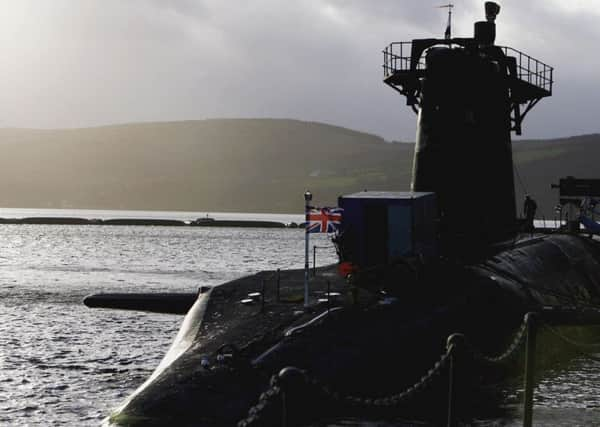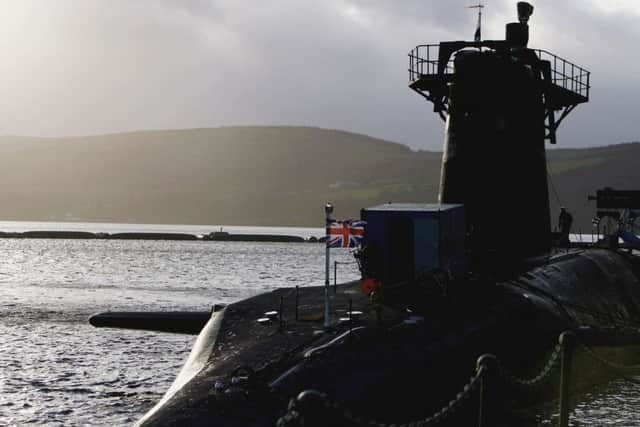Corbyn suffers Trident blow at Scottish conference


Yet more confusion surrounded the Labour position on the nuclear deterrent when the motion tabled by the steel workers union Community was backed by the Scottish party.
The motion was passed on the same day that Mr Corbyn urged the Scottish arm of his party to back the scrapping of the new missile system during a key conference vote to be held tomorrow.
Advertisement
Hide AdAdvertisement
Hide AdMr Corbyn underlined his commitment to scrapping the new Trident during his first speech to a Scottish Labour conference as UK leader.


However, before he stood up to speak Labour delegates in Perth had supported the motion which suggested building the new weapons system would help the Scottish steel industry.
Trident has become the defining issue of the Scottish conference and yesterday delegates and trade unions voted to hold a debate on nuclear weapons tomorrow that has the potential to put the Scottish and UK parties at loggerheads.
Mr Corbyn is hopeful the Scottish party will back his position.
However, officially the UK party is in favour of multilateral disarmament, only giving up nuclear weapons when other countries agree to do so too.
Yesterday, delegates appeared to see some merit in the weapons system when they supported a clause saying: “Conference believes the new ferries to be built at Ferguson Marine in Port Glasgow, the Vanguard submarine successor programme to be built at BAE in Barrow-in-Furness [in Cumbria] and the UK government’s flood defence programme all present significant opportunities to use steel plate produced at Dalzell and Clydebridge.”
The successor programme, referred to in the motion, aims to replace the four Trident missile-equipped, Vanguard-class submarines, which have provided Britain’s nuclear deterrent capability since 1995.
Speaking after the Community motion was passed, the union’s strategy and policy director John Park said: “We are supportive of the nuclear deterrent and of the conventional defence industry. Our concern is that the Ministry of Defence uses more Scottish and British steel.”
Advertisement
Hide AdAdvertisement
Hide AdThe motion was passed in response to steel firm Tata’s decision to close its two plants in Scotland with the loss of 270 jobs – a move with the potential to drive the final nail into the coffin of the Scottish steel industry.
The company said 225 jobs would go at the Dalzell plate rolling works in Motherwell and 45 posts at the Clydebridge plant in Cambuslang.
Tata plans to mothball both facilities with a further 900 posts going at its facility in Scunthorpe.
The firm blamed the cuts on a flood of cheap imports from China, a strong pound and high electricity costs.
Despite the Community motion, Mr Corbyn urged Scottish Labour to vote for scrapping the new Trident weapons system but warned that jobs on the Clyde had to be protected.
Mr Corbyn told The Scotsman he would be “pleased” if the Scottish conference backed his personal position of ruling out Trident renewal.
Asked if Scottish Labour taking that position would create momentum for the UK party to follow suit, Mr Corbyn said: “It must encourage those that see an alternative.”
Mr Corbyn told delegates: “You will decide what position you must take on that for the good of Scotland. Whatever you decide, it must be in solidarity with workers who may feel threatened and communities that may feel vulnerable.”
Advertisement
Hide AdAdvertisement
Hide AdAfter it emerged that Scottish Labour would be holding a debate on Trident renewal, Defence Secretary Michael Fallon issued a statement warning that voting against renewal would send the “wrong message” about Britain’s role in maintaining global security.
Mr Fallon said: “We don’t know the threats we will face in 40 years’ time and having our nuclear deterrent is Britain’s ultimate insurance policy.
“Not only does it underpin Britain’s security, it is a massive benefit to Scotland’s economic security.
“The Conservative government has pledged to invest a further £500 million to ready the Faslane base for a new generation of Trident subs – investment which will guarantee thousands of jobs for the next 40 years.”